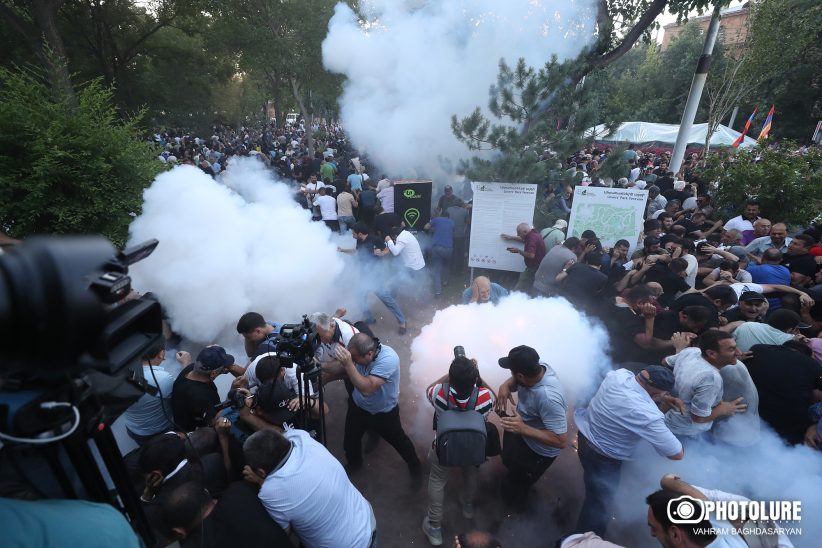The second quarter of 2024 was unprecedented in post-revolutionary Armenia in terms of physical violence against media workers.
Although the protest actions organized by the opposition in recent years, as a rule, were accompanied not only by clashes between the police and demonstrators, but also by many violations of the rights of media representatives, they reached their peak during the reporting period. In particular, 14 cases of physical violence against journalists and cameramen were registered, most of which, 11, were the result of disproportionate actions of the law enforcement bodies. 9 other cases of various other pressures, insults, threats, obstruction of professional activities were recorded, too. The number of court cases against journalists and media increased with 17 such new lawsuits being filed in April-June, vis à vis 12 in the previous quarter. There were 19 violations of the right to receive official information from state bodies and disseminate it.
The second quarter of 2024 coincided with the border demarcation process between Armenia and Azerbaijan and related protests, which began in the Tavush region of the Republic of Armenia. Later this movement reached Yerevan. In relation to violence, obstruction of professional activities, and other pressures on journalists and cameramen covering the events both in the regions and in the capital, the CPFE and partner journalistic organizations issued joint statements, demanding the authorities to ensure the unobstructed work of the media in crisis situations and hold the police officers who had abused their powers accountable. In some cases, law enforcement agencies responded to those statements. In particular, on May 14, the Investigative Committee announced in a letter addressed to the CPFE that in connection with the cases of violence against media representatives, other evidence collection and procedural actions were being taken in order to ensure the objectivity, comprehensiveness and normal course of the investigation. And on May 23, it was reported that the demand of CPFE and partner organizations to inform the public about the cases of violence against media representatives and their investigations was taken note of. Later, on June 22, the CPFE and partner organizations received a letter from the same Investigative Committee stating that the June 13 statement was attached to the criminal proceedings initiated in the General Department of Investigation of Particularly Important Cases.
The international organization Reporters Without Borders and the US Embassy in Armenia also condemned the violence against media workers during the protests.
In general, during the quarter, a number of international organizations referred to the freedom of speech situation in Armenia in their reports. Those documents also mention cases of violations of the rights of media representatives. Thus, in the Nations in Transit 2024 report published on April 10, the Freedom House international organization stated that in 2023, a declining trend in democracy decline was recorded in Armenia, including in democratic institutions.
The US State Department’s annual report “2023 Country Reports on Human Rights Practices: Armenia” published on April 23 also emphasized that the media in Armenia continues to be polarized, yet individual citizens and the media enjoy the right to freedom of speech and freely criticize the government.
In its annual report published on April 24, the Amnesty International human rights organization expressed concern, especially regarding the journalists injured during the protests that took place in Yerevan on September 19, 2023.
The polarization of the media is also cited as a serious problem in the annual report of the international organization Reporters Without Borders, published on May 3, whereas the shaped environment of pluralism in place was mentioned as an important achievement. Due to this, Armenia improved its position by 6 points in the ranking of press freedom. Last year, the RA was the 49th on the list of 180 countries, this year it ended up, ranking the 43rd. However, the organization noted that the legal framework regulating this sector in the country did not sufficiently protect the freedom of the press and did not comply with European standards.
In this regard, the joint work of CPFE and partner journalistic organizations, the NA Standing Committee on Science, Education, Culture, Diaspora, Youth and Sports Affairs and the Ministry of Justice for drafting the media institution reforms concept is most urgent. The draft law on making amendments and supplements to the Law on Media, submitted to the RA government on April 11, also stems from the logic of that process. Later, on April 29, parliamentary hearings were also held to discuss the draft law.
Photo credits Photolure News Agency








